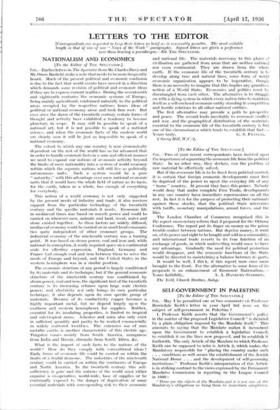NATIONALISM AND ECONOMICS
LETTERS TO THE EDITOR
[Correspondents are requested t.) keep their letters as brief a: is rewona5ly potsible. The most suitable length is that of one of our News of the Week" paragraphs. Signed letters- are given a preference over those bearing a pseudonym.—Ed. THE SPECTATOR.
[To the Editor of TI1E SPECTATOR.] Sin,—Earlier letters in The Spectator from Mr. Charles Davy and Mr. Owen Barfield strike a note that needs to be more frequently heard. Much of the present political and economic confusion is due to the fact that world events have moved in a direction which demands some revision of political and economic ideas if they arc to express current realities. During the seventeenth and eighteenth centuries the economic systems of Europe, being mainly agricultural, conformed naturally to the political areas occupied by the respective nations; hence ideas of political or national economy arose and took firm root. But ever since the dawn of the twentieth century certain forms of thought and activity have exhibited a tendency to become planetary in scope. It may still be possible to speak of a national art, but it is not possible to -speak of a national science, and when the economic facts of the modern world are clearly seen it will be just as impossible to speak of a national economy.
The extent to which any one country is now economically dependent on the rest of the world has so far advanced that in we to handle economic facts in a sane and efficient manner we need to expand our notions of economic activity beyond the limits of mere nationality into a system of world economy within which the separate nations will still live as politically autonomous units. Such a system would be a pure " autarchy," with this advantage over mere national economic units that it would have the whole field of nature as its basis, for the earth, taken as a whole, has enough of everything for everybody.
This notion of a world economy is not only suggested by the present needs of industry and trade, it also receives support from the particular teehnology of the twentieth century and the specific materials it needs: Economic life in mediaeval times was based on muscle power and could be carried on wherever men, animals and land, wood, water and stone existed together. As these factors are widely diffused,- mediaeval economy could be carried on in small local communi- ties quite independent of other economic groups. The industrial economy of the nineteenth century was a turning point. It was based on steam power, coal and iron and, while national in conception, it really required space on a continental scale for effective expression. England, Germany and France had enough coal and iron between them to serve the needs of Europe and beyond, and the United States in the western hethisphere was in a similar Position.
The economic structure of any period is largely conditioned by its materials and its technique, but if the general economic structure of the nineteenth century was conditioned by steam power, coal and iron, the significant fact of the twentieth century is its increasing reliance upon large scale electric power; and electricity not only brings its own particular technique, it also depends upon its own specific group of materials. Because of its conductivity copper becomes a highly important metal, but we depend largely upon the southern and western hemispheres for supplies. Rubber, essential for its insulating properties, is limited to tropical and sub-tropical areas. Asbestos and mica also only exist in sufficient quantity and purity to be worked commercially in widely scattered localities. The extensive use of rare metallic earths is another characteristic of this electric age. Tungsten conies mainly from South America, manganese from India and Russia, chromite from South Africa, &c.
What is the import of such facts to the nations of the world ? how do they comply with conventional ideas ? Early forms of economic life could be carried on within the limits of a feudal demesne. The industries of the nineteenth century could be curried on within the continents of Europe and North America.. In the twentieth century this self- sufficiency is gone and the nations of the world must either organise a co-operative, world-wide, base of supplies. or be continually exposed to the danger of deprivation of some essential materials-with corresponding risk to their economic
and national life. The materials necessary to this phase or civilisation are gathered from areas that are neither national nor even continental. They are drawn from the whole earth. If the economic life of the twentieth century is to develop along true and natural lines, some form of world economic organisation appears to be imperative, though there is no necessity to imagine that this implies any grandiose notion of a World State. Economics and politics must be disentangled from each other. The alternative is to struggle on with a dying system in which every nation tries to maintain itself as a self-enclosed economic entity standing in competitive and hostile relations to all other national entities.
The first alternative may provide a path to -prosperity and peace. The second leads inevitably to economic conflict and war, and the geographical distribution of the materials essential to the economic life of the twentieth century is bnt one of the circumstances which tends to establish that friet.---












































 Previous page
Previous page